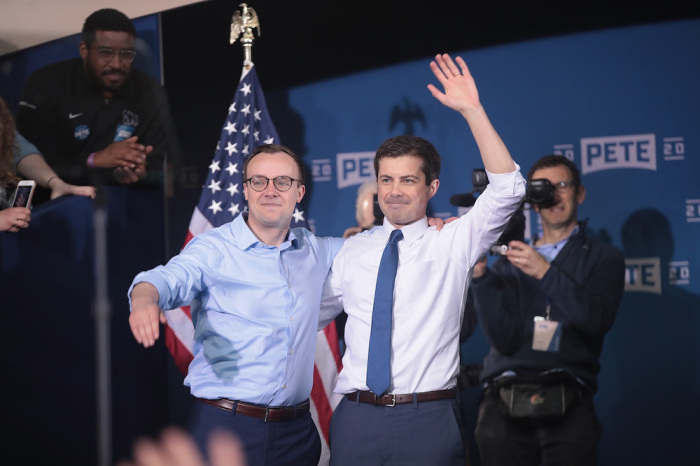Gay 2020 hopeful Pete Buttigieg quotes Matthew 25 in new campaign ad

Openly gay Democrat presidential candidate Pete Buttigieg quoted the words of Matthew 25 in a new 30-second television commercial airing in South Carolina as he continues to invoke religion in an attempt to appeal to black voters and liberal Christians.
The new commercial is titled “Welcomed Me” and is the South Bend, Indiana Mayor’s first advertisement in the Palmetto State. It opens by showing Buttigieg giving remarks at a gathering of Iowa Democrats in early November.
In the speech, Buttigieg, an Episcopalian, pulls from one of the more well-known passages of the New Testament in what appears to be a dig at Christian conservative support for President Donald Trump.
“In our White House, you won’t have to shake your head and ask yourself: whatever happened to ‘I was hungry and you fed me. I was a stranger and you welcomed me,’” Buttigieg said, referring to Jesus’ words in Matthew 25:35.
The ad then cuts to a scene with Buttigieg talking to the camera and saying that “we have to unify the American people.”
“[I]t doesn’t mean pretending that we are all the same,” he said. “It means unifying around issues from wages and family leave to gun violence and immigration.”
The commercial concludes by cutting back to Buttigieg addressing the Iowa crowd and telling them that the hope is to have “an American experience defined not by exclusion but by belonging.”
The commercial began airing Tuesday as part of a $2 million ad buy, according to The State.
The commercial comes as the Buttigieg campaign has stepped up its efforts in South Carolina as the state’s primary will be held on Feb. 29.
According to the Real Clear Politics average of South Carolina primary polling, Buttigieg ranks fourth with 6.5 percent support behind former Vice President Joe Biden (35 percent), Sen. Elizabeth Warren (16.3 percent) and Sen. Bernie Sanders (12.8 percent).
Buttigieg seems to be fairing better in national polling. Real Clear Politics average of national primary polling shows Buttigieg in fourth place with 11.4 percent support.
As African-Americans comprise 60 percent of South Carolina’s Democratic primary electorate, Buttigieg has also made attempts over the course of his campaign to reach out to black voters.
On Sunday, Buttigieg attended service at Greenleaf Christian Church in Goldsboro, North Carolina. The church is pastored by progressive social justice activist and NAACP leader Rev. William Barber II.
During the service, Barber argued that America can’t understand black people without understanding the LGBT community and vice versa.
“You can’t understand the LGBT community without understanding black folk, you can’t understand black folk without understanding the LGBT community,” Barber said.
Barber’s comments come after Georgia pastor Rev. Paul S. Morton suggested that Democrat Christians would not vote for Buttigieg because he is in a same-sex marriage. Additionally, focus group findings stated that Buttigieg’s sexuality could be a barrier for undecided black voters in the state.
Paul A. Djupe, a political science professor at Denison University, released a report earlier this year that found that African American Democrats tend to have less favorable opinions of homosexuals than other Democrats.
“Mayor Pete appears to have a heavy lift in front of him to convince black voters to support him,” Djupe concluded.
“Polls already indicate very weak support for him among African Americans, though I would not want to chalk that up solely to prejudice since there are arguments available about how his mayoralty has affected the black community.”
Pastor Joe Darby of Nichols Chapel AME Church in South Carolina told CBS News in July that southern black churchgoers “tend to be very progressive when it comes to issues of advocacy, equity [and] justice” but tend to be “socially conservative on issues of the flesh.”
“[T]here's slight discomfort that I've learned, with someone simply being LGBT," Darby said. “It's unfortunate because he's got a good message … and he does an excellent job in articulating his faith.”
Buttigieg is no stranger to citing the Bible during his campaign.
In July, Buttigieg lifted a message from the Old Testament book of Proverbs during a Democratic primary debate to shame Christian Republicans who oppose a $15 minimum wage.
“And so-called conservative Christian senators right now in the Senate are blocking a bill to raise the minimum wage, when scripture says that whoever oppresses the poor taunts their maker,” Buttigieg said, appearing to refer to the words of Proverbs 14:31.
In a debate in June, Buttigieg contended that there is a “hypocrisy” within the Republican Party, saying that the party likes to “cloak itself in the language of religion” while migrant families are being separated by federal agents at the U.S. southern border.
Buttigieg attempted to use the Bible to defend his support for abortion rights in a September interview with The Breakfast Club.
“[Pro-life people] hold everybody in line with this one piece of doctrine about abortion, which is obviously a tough issue for a lot of people to think through morally,” Buttigieg said. “Then again, there’s a lot of parts of the Bible that talk about how life begins with breath.”
“Even that is something that we can interpret differently,” he added. “No matter what you think about the cosmic question of how life begins, most Americans can get on board with the idea of, ‘I might draw the [line] here. You might draw the line there.’ The most important thing is the person who should be drawing the line is the woman making the decision.”
Follow Samuel Smith on Twitter: @IamSamSmith
or Facebook: SamuelSmithCP




























